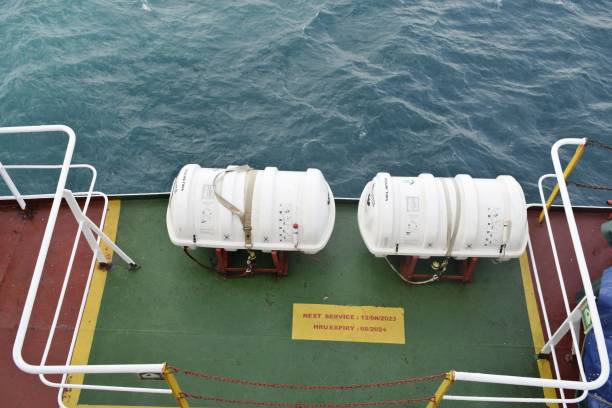Fire safety is critical in Dubai’s maritime sector. Ships, yachts, and offshore platforms operate in high-risk environments. Fire outbreaks can cause severe damage, financial losses, and endanger lives. A marine smoke detector is essential for preventing disasters at sea.
In this guide, we’ll explore how these devices work, their types, installation, and maintenance requirements.
Why Marine Smoke Detectors Are Crucial for Maritime Safety
Marine environments pose unique fire hazards. Engine rooms, fuel storage areas, and electrical systems increase fire risks. Unlike buildings, ships have limited escape routes, making early detection vital.
A marine smoke detector alerts the crew before a fire spreads. It provides enough time for action, reducing damage and saving lives. Dubai’s strict maritime safety regulations also mandate fire detection systems on vessels.
How Marine Smoke Detectors Work
Marine smoke detectors detect smoke particles in the air. They trigger alarms to warn the crew. There are different detection methods, but all serve the same purpose—early fire detection.
Types of Marine Smoke Detectors
Various smoke detection systems are used on vessels. Each type suits different environments and fire risks.
Ionization Smoke Detectors
- Detect fast-flaming fires
- Use radioactive material to sense smoke
- Suitable for engine rooms and electrical panels
Optical (Photoelectric) Smoke Detectors
- Detect slow-burning, smoldering fires
- Use a light beam to identify smoke particles
- Ideal for cabins, storage rooms, and control areas
Aspirating Smoke Detection Systems
- Use air sampling technology
- Highly sensitive and detect smoke before visible flames appear
- Suitable for critical areas like data rooms and enclosed machinery spaces
Heat and Smoke Combination Detectors
- Detect both smoke and heat changes
- Provide double-layer protection
- Ideal for areas with temperature fluctuations
Marine Smoke Detector Installation Guidelines
Proper installation ensures the system functions effectively. Here are key factors to consider:
Strategic Placement
- Install detectors in key fire-risk areas, such as engine rooms, cargo holds, kitchens, and crew cabins.
- Avoid placement near ventilation systems, which can affect smoke detection.
Compliance with Dubai’s Maritime Safety Standards
- Dubai follows IMO (International Maritime Organization) and SOLAS (Safety of Life at Sea) regulations.
- Ensure the smoke detection system meets Dubai Maritime City Authority (DMCA) requirements.
Regular System Testing
- Conduct weekly and monthly tests to ensure detectors are working.
- Perform simulated smoke tests to confirm alarm response.
Connection to Fire Suppression Systems
- Many vessels integrate smoke detectors with automatic fire suppression systems.
- This ensures immediate action in case of fire.
Marine Smoke Detector Maintenance & Testing
Regular maintenance is crucial for reliability. Saltwater exposure, humidity, and vibrations can impact performance.
Routine Cleaning
- Remove dust, salt deposits, and grease buildup.
- Use manufacturer-approved cleaning methods.
Sensor Calibration
- Test and calibrate sensors as per manufacturer guidelines.
- Replace sensors every 3-5 years for optimal efficiency.
Battery and Power Supply Checks
- Ensure backup power systems function properly.
- Check wiring and connections for corrosion.
Crew Training and Fire Drills
- Train crew members to respond to alarms effectively.
- Conduct regular fire drills to enhance emergency response.
Key Features to Look for in a Marine Smoke Detector
Choosing the right smoke detector for your vessel is essential. Consider these features:
High Sensitivity & Fast Response
- Choose detectors that detect smoke in its earliest stages.
Water & Corrosion Resistance
- Dubai’s marine environment is humid and salty.
- Select detectors designed for harsh maritime conditions.
Integration with Fire Alarm Systems
- A good marine smoke detector should connect to the ship’s fire control panel.
Automatic Alerts to Control Rooms
- Alerts should be visible and audible across the vessel.
- Some systems include remote monitoring for offshore platforms.
Certification & Compliance
- Ensure compliance with SOLAS, DMCA, and IMO regulations.
- Choose systems approved for maritime use.
Dubai’s Maritime Regulations for Fire Detection Systems
Dubai enforces strict fire safety laws for vessels. The Dubai Maritime City Authority (DMCA) regulates maritime safety. Key requirements include:
- All ships and offshore platforms must have certified smoke detectors.
- Smoke detection systems must be tested regularly.
- Emergency response plans must include fire detection protocols.
Failure to comply can lead to fines, penalties, or vessel operation bans.
Conclusion
Expert Fire Detection and Alarm Systems by Al Safwan Marine is a vital part of any ship’s fire safety system. It provides early warning, protects assets, and saves lives. In Dubai, where maritime safety standards are strict, proper installation, maintenance, and compliance are essential.
Investing in a reliable marine smoke detection system ensures smooth sailing while keeping vessels, cargo, and crew safe.





